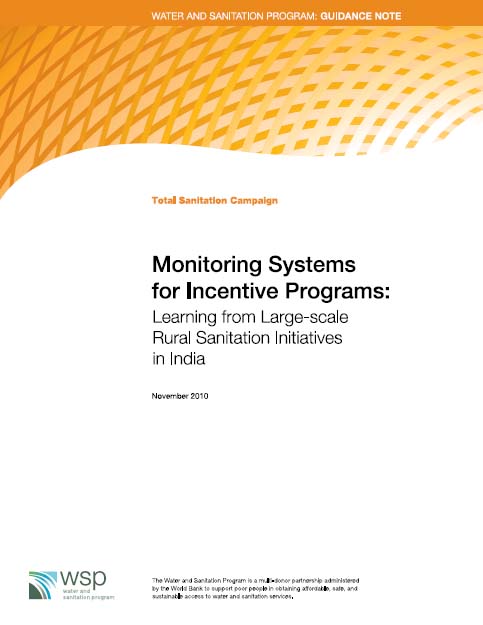Upneet Singh
What does it take to scale up rural sanitation ? - A working paper by Water and Sanitation Program
Posted on 04 Aug, 2012 10:22 AMThe deplorable condition of sanitation facilities in developing countries, has been gaining enormous attention in the recent times. It is no longer a “forgotten issue”.Though measure and several initiatives have been taken by national governments and international agencies to address this problem, yet a lot has to be done and learned about dealing with it.
Handbook on scaling up solid and liquid waste management in rural areas by Water and Sanitation Program, World Bank
Posted on 16 Jul, 2012 02:41 PMThis handbook by Water and Sanitation Program, World Bank seeks to address the gap existing in the programmatic aspects of waste management in rural areas. It focuses on planning, institutional, community mobilization and financial dimensions of implementing waste management program.
Monitoring system for incentive programs – Learning from large-scale rural sanitation initiatives in India – A report by the Water and Sanitation Programme
Posted on 21 May, 2011 02:15 PM It is a part of the Global Scaling Up Rural Sanitation project of the Water and Sanitation Programme, World Bank and focuses on learning how to combine the approaches of Community Led Total Sanitation (CLTS), behavior change communications, and social marketing of sanitation to generate sanitation demand and strengthen the supply of sanitation products and services at scale, leading to improved health for people in rural areas. This is one in a series of knowledge products designed to showcase project findings, assessments and lessons learned in the project.
It is a part of the Global Scaling Up Rural Sanitation project of the Water and Sanitation Programme, World Bank and focuses on learning how to combine the approaches of Community Led Total Sanitation (CLTS), behavior change communications, and social marketing of sanitation to generate sanitation demand and strengthen the supply of sanitation products and services at scale, leading to improved health for people in rural areas. This is one in a series of knowledge products designed to showcase project findings, assessments and lessons learned in the project.
Over the last few years, the concept of open-defecation free communities has emerged as one of the building blocks toward achieving total sanitation. The term ‘access’ is widely used to capture increase in sanitation usage. However, a clean environment is a public good. Hence, there was a need to achieve total sanitation at the community level to realize public health benefits. This has led policy makers and practitioners to adopt strategies that achieve community-wide total sanitation status, which includes the community becoming open-defecation free, and adopting safe hygiene and environmental sanitation practices.
Benchmarking local government performance on rural sanitation in Himachal Pradesh - A learning note by WSP
Posted on 06 Jan, 2011 06:43 AMThis document deals with benchmarking local government performance on rural sanitation in Himachal Pradesh. To strengthen outcome-focused management of the rural sanitation sector in India, the Water and Sanitation Program’s (WSP) Global Scaling Up Sanitation Project, in partnership with the Government of Himachal Pradesh, developed a five-step process to monitor and benchmark performance on a monthly basis across all twelve districts in the state. Applied at the local government (district) level, this process has proven to be an effective approach, one that can improve reporting, monitoring, and performance.